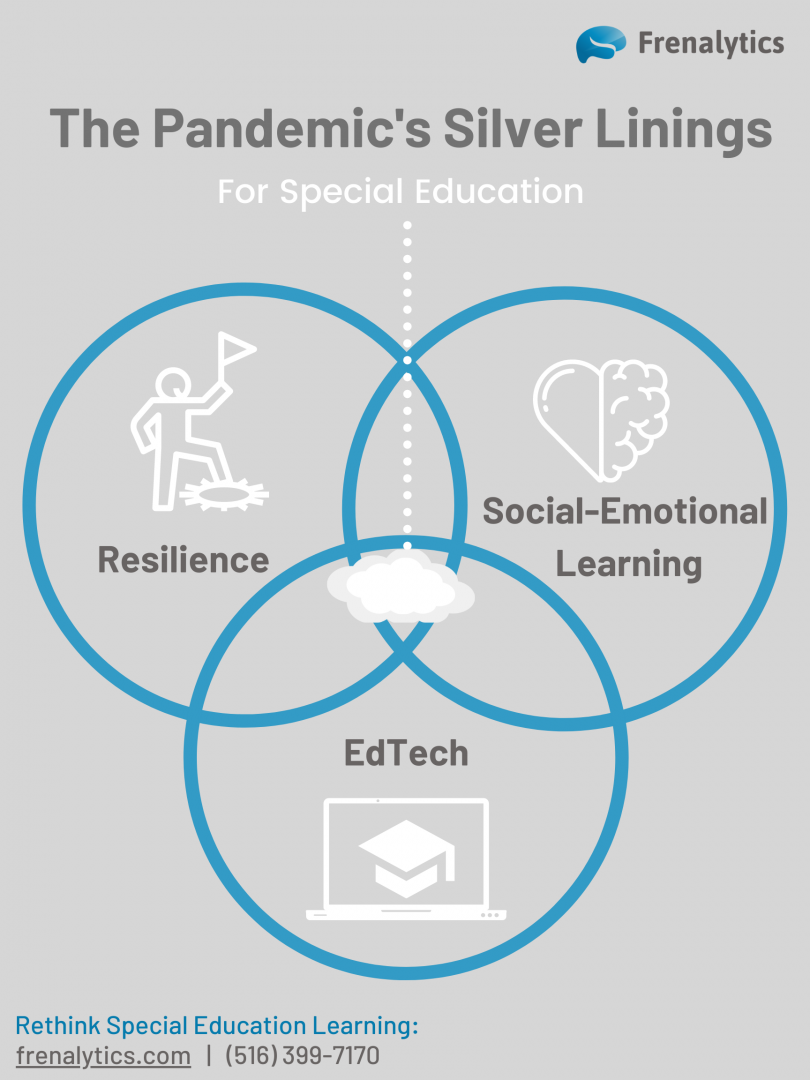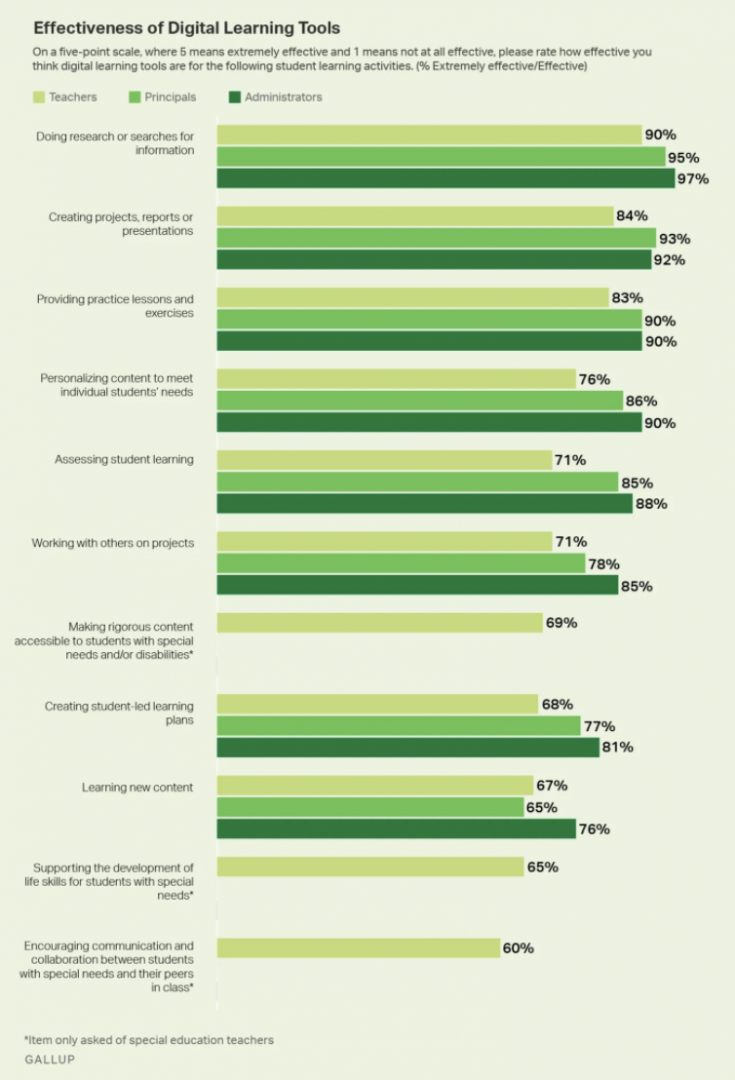by Charlotte Berman | May 11, 2021
While the pandemic has prompted widespread shifts in learning and teaching methods, there are a number of “silver linings” that have emerged this past year, particularly for special education. These instances of success are vital as they remind us that educators, students, and parents alike have shown incredible resilience and have embraced change in unexpectedly positive ways. Below are some special education “silver linings” from the past year, such as enhanced student resilience, the recognition of Social Emotional Learning, and the embrace of EdTech:

1) Enhancing Student Resilience and Finding New Teaching Methods
During their yearly progress report meeting, educators from Foxboro Public Schools in Foxborough, MA announced how many special education students have thrived despite upheavals prompted by the pandemic. They have flourished in unanticipated ways this disjointed school year thanks to the creativity and commitment of teachers, parents, and staff.
Foxboro Special Education teachers reported that despite unremarkable challenges, special education students were able to make encouraging progress and continued growth over the past year. Receiving remote support services fostered a unique sense of independence among special education students. These students enhanced their proficiency in a variety of skills and have taken charge of their own learning by logging on remotely.
Remote learning has also resulted in positive changes for parents of special education students. Web-based meetings proved to be more convenient and allowed for strong relationship building among parents and teachers.
When reflecting upon this past year of patience and perseverance, Foxboro special education teachers remarked that “there really is a lot that’s come out of it for us as special educators,” and how “it’s been amazing to see what we have been able to do as staff, and even more so how resilient our students are and how much we were able to learn from them.”
2) Realizing the Importance of Social Emotional Learning for All Students
The pandemic has prompted everyone in education, not just special education, to reconsider how our students learn and how teachers and parents can best facilitate their success. Drawing from the foundations of special education, there has been an increased level of empathy, understanding, and support, better known as “Social-Emotional Learning” concepts, woven into classrooms across the entire education spectrum.
Social-emotional learning (SEL) is a method of learning that intentionally considers factors such as cooperation, empathy, communication, and active listening in the classroom. Core competencies of SEL include self-awareness, self-management, relationship building, responsible decision-making, and social awareness. All students can benefit from SEL, yet building social and emotional competence has been a long-time cornerstone of special education.
Integration of SEL classroom activities has helped students that feel especially anxious amidst the pandemic’s many changes. SEL activities help create a stronger sense of normalcy and routine that can help all students cope with continued challenges.
The pandemic has encouraged all educators to embrace a newfound focus on students’ emotional needs. Executive director of High Road School of Windham County in Hartford, CT believes that special education practices, particularly SEL, should and can inform everyone’s learning in a post-pandemic world. Social-emotional learning, one of the many unique strengths of special education, will hopefully remain at the forefront of all K-12 classrooms.
3) Discovering the Power of EdTech in Special Education Classrooms

Source: GallUp
Educational technology, or EdTech, is the combination of computer hardware, software, and educational theory aimed to facilitate and enhance learning. EdTech has existed long before K-12 schools moved to online remote learning due to the pandemic. However, this past year has led to an increased embrace of several EdTech services and tools in classrooms across the country.
Educators from Arizona Autism Charter Schools in Phoenix, AZ detailed how EdTech and digital learning tools have made learning more accessible for students with Autism. The start of remote and hybrid learning last year increased funding for EdTech upgrades including Chromebooks, hotspots, and iPads. The Director of Arizona Autism Charter School believes that these upgrades and the embrace of digital tools has opened up new avenues of success for special education students.
EdTech provides a new medium for these students to communicate and demonstrate new skills. Integrating EdTech into the classroom has brought about more personalized lessons and has given teachers more time to plan and help students. The use of digital tools in the classroom can also help sharpen the skills needed for an increasingly digitized workforce. Robotics and coding projects made possible by EdTech have helped keep Arizona Autism Charter School students engaged in unique problem-solving-focused lessons.
Schooling before the pandemic did not work for everybody, and the pandemic has opened the door for students with special needs to try out online learning. Special education teachers were previously unsure if they could meaningfully engage students through online platforms. If not for the pandemic, they might still be hesitant to adopt EdTech.
Despite initial learning curves that came with remote learning, the integration of EdTech and the redesigning of learning methods have been unexpectedly well-liked. 100 Arizona Autism Charter School families have elected to continue with a virtual learning option and nearly 30 percent of families have expressed interest in virtual learning even after the pandemic. EdTech and remote learning methods have made education more accessible to special education students and Arizona Autism Charter School is just one of many success stories.
Connecting special education classrooms and EdTech is a major silver lining that has emerged from the pandemic. Widespread shifts to online learning are what prompted the Frenalytics team to launch FrenalyticsEDU, an EdTech solution designed for students with special needs. Our patented digital learning tool provides highly personalized and interactive educational sessions for students with Autism, Down syndrome, and other intellectual disabilities.
Frenalytics is loved by students in special ed schools from kindergarten all the way through high school. We are the first comprehensive and interactive software platform to streamline life skills learning within special education, including enrolling students, managing transitions, and reporting outcomes. Our team at Frenalytics works extensively with educators to craft a one-of-a-kind software platform that helps students live more independent lives while saving time and money for parents and schools.
Want to see how Frenalytics helps special needs students live more independent lives?
Click here to learn more, or give us a call at (516) 399-7170.
Charlotte Berman is a current senior at Boston College studying Psychology and Marketing. As a member of the Frenalytics marketing team, Charlotte has loved seeing how technology can help those with cognitive and learning challenges. Outside of work and school, catch Charlotte tap dancing or playing tennis. Contact Charlotte: charlotte@frenalytics.com

